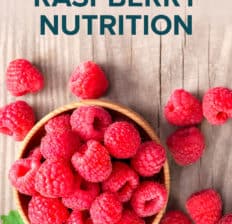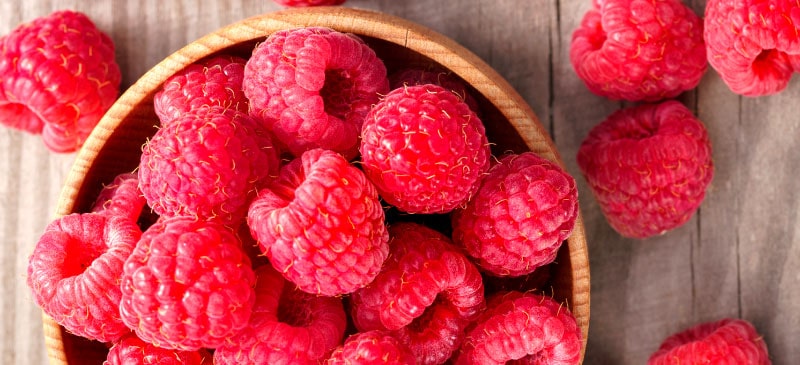


A summer favorite in my house, raspberries are a wonderful addition to pancakes, granola and yogurt. This is good news for those of you who love to utilize these delicious berries, because raspberry nutrition is off the charts.
What makes the raspberry so great? It starts with the phytochemicals present in this delicious fruit, which are responsible for the dark color in raspberries. These phytochemicals provide useful phytonutrients that make raspberry nutrition so beneficial.
Let’s take a look at just how beneficial these delicious berries can be.
What Is the Raspberry?
The red raspberry has been around for a very long time and noted as growing wild in the foothills of Mount Ida during the time of Christ. It’s technically known as Rubus idaeus and originated in Asia Minor and North America.
It’s believed that the Romans are responsible for wide-range cultivation seen in Europe. In fact, medieval Europe used wild berries for their nutritional value as well as for other more practical things, such as painting.
Ad


Raspberries have a short shelf life, which is probably one of the reasons they may come at a high price and why buying them at your local farmers market is the best choice. They’re usually harvested twice a year — once in the fall and once in the summer. If the fruits have gone past their shelf life, they become a part of processed foods and products, such as juices, jams, and even oils and lotions.
The U.S. is the the third largest raspberry producer in the world. We usually see raspberries as red (Rubus idaeus), which is the most popular, but there are also black (Rubus occidentalis), purple — which is a cross of red and black raspberries — and yellow varieties, a mutation of red or black raspberries. The highest yields occur in California, Oregon and Washington.
Raspberry Nutrition Facts
Raspberries run a pretty close race with blueberries as nutrient-dense and high-antioxidant powerhouses.
One cup (approximately 123 grams) of raw raspberries contains about:
- 64 calories
- 14.6 grams carbohydrates
- 1.5 grams protein
- 0.8 gram fat
- 8 grams fiber
- 32.2 milligrams vitamin C (54 percent DV)
- 0.8 milligram manganese (41 percent DV)
- 9.6 micrograms vitamin K (12 percent DV)
- 27.1 milligrams magnesium (7 percent DV)
- 25.8 micrograms folate (6 percent DV)
- 0.1 milligram copper (6 percent DV)
- 1.1 milligrams vitamin E (5 percent DV)
- 0.8 milligram iron (5 percent DV)
- 186 milligrams potassium (5 percent DV)
- 0.7 milligram niacin (4 percent DV)
- 0.4 milligram pantothenic acid (4 percent DV)
- 35.7 milligrams phosphorus (4 percent DV)
Raspberries vs. Blueberries
Raspberries have similar health benefits as blueberries in that they both may protect against cancer, support bone health, fight aging, improve heart health and aid in weight loss. However, they have some differences as well.
Overall, raspberries are higher in fiber and vitamin C, and they’ve been shown to help ease arthritis pain and manage diabetes. On the other side, blueberries are higher in vitamin K, support digestion and benefit the skin.
Here are a few stats that separate the two:
- Raspberries have a good amount of fiber over the blueberry.
- The blueberry has the raspberry beat with vitamin K. Though the raspberry contains 12 percent of the daily recommendation, the blueberry ranks higher coming in at 33 percent.
- While both are vitamin C foods, the raspberry jumps to the top in this category. The raspberry contains twice as much with a whopping 54 percent of the daily recommended intake.
Health Benefits
1. Boost Heart Health
We know that most berries provides tons of benefits, and raspberries are no exception. In fact, raspberry nutrition is known to boost heart health.
An animal study published in Scientific Reports was conducted to review immune responses and the efficacy of reducing chronic diseases of red raspberries. The results revealed that the anthocyanin found in raspberries provided anti-inflammatory benefits that may help the heart. Specifically, the study showed that raspberries had the highest efficiency of releasing nitric oxide, which helps improve blood flow.
Additionally, the polyphenols in raspberries have been shown to hold beneficial effects for people with peripheral artery disease, a narrowing of the peripheral arteries to the legs, stomach, arms and head. Given the anti-inflammatory capabilities along with the polyphenol content, raspberry nutrition may help reduce the risk of coronary heart disease as well and boost overall heart health.
2. Help With Weight Loss
Raspberries may be able to help you manage your weight. Because they contain amazing phytonutrients, these little powerhouses of nutrition that can help boost metabolism.
Raspberry ketones are natural phenolic compounds and have specific nutrients called rheosmin that may be responsible for this amazing benefit, not to mention the high fiber content. By supplementing with raspberries, animal studies indicate that weight gain through the accumulation of fat can be reduced, and the evidence suggests that treatment with raspberries can help decrease the size of fat cells.
In one particular study conducted by the Center for Applied Health Sciences in Ohio and published in the Journal of the International Society of Sports Nutrition, 70 obese but otherwise healthy participants were randomly assigned to supplementing with raspberry ketone, caffeine, capsaicin, garlic, ginger and citrus aurantium or a placebo in a double-blind experiment. After eight weeks of supplementation, exercise training and a calorie-restricted diet, those who supplemented saw improvements in hip girth, waist girth and body composition.
Those who took the placebo also experienced beneficial weight loss, but the group who supplemented with the raspberry ketone mix saw slightly better results.
READ RELATED: Here’s What a Week of ButcherBox, the Sustainable Meat Delivery Service, Actually Looks Like
3. Can Help Manage Diabetes
Raspberries are very low on the glycemic index, ranking as a 3 in glycemic load. Low-glycemic foods, such as raspberries, have little impact on blood sugar, ultimately helping stabilize it.
Ad


Overall, it makes this low-sugar and high-fiber food option a great choice to include in any diabetic diet plan.
4. May Help Prevent Cancer
The black raspberry has some powerful characteristics that may offer cancer prevention. Raspberries offer high levels of ellagic acid, a compound that naturally occurs in raspberries as well as strawberries and walnuts, called a tannin.
Laboratory studies shared by the Memorial Sloan Kettering Cancer Center show that the ellagic acid may be able to help prevent cancer. The research showed that when ellagic acid was consumed before and during exposure to cancer-causing carcinogens, fewer liver tumors developed than a in diet without the ellagic acid. Similar results were shown with lung cancer.
Another study conducted at the Ohio State University Comprehensive Cancer Center on rats showed that the anthocyanins in black raspberries may reduce tumors. Diets containing freeze-dried black raspberries suppressed the development of tumors in the esophagus of the studied subjects, and the results indicate that the anthocyanins may have chemopreventive properties.
These studies show that raspberries are some of the most promising cancer-fighting foods you can consume.
5. Ease Arthritis Pain
Raspberries have amazing anti-inflammatory properties that may alleviate symptoms of arthritis. That’s why raspberries make a great addition to any arthritis diet plan.
An animal study conducted by the Department of Biomedical and Pharmaceutical Sciences at the University of Rhode Island’s College of Pharmacy and published in the Journal of Agricultural and Food Chemistry revealed that the red raspberry fruit and raspberry extracts, which contain the polyphenols, anthocyanins and ellagitannins, provided anti-inflammatory properties that protected the cartilage in subjects with arthritis — perhaps because there was a decrease in the degradation of the protein, proteoglycan and type II collagen.
The treated subjects had a lower occurrence rate and less severity of arthritis compared to control subjects. There was way less inflammation, pannus formation, cartilage damage and bone resorption.
This suggests that red raspberry polyphenols may help reduce the symptoms and severity of arthritis, which is no surprise since raspberries are potent anti-inflammatory foods.
6. Fight Aging
The antioxidants are pretty phenomenal in raspberry nutrition, and these antioxidants can help reduce the signs of aging by fighting free radicals found throughout the body. Raspberries contain the well-known potent vitamin C as well as antioxidant carotenoids and quercetin.
Raspberries have been rated as high in antioxidants on the ORAC scale, putting them up there with the famous blueberry, which is well-known for its antioxidants. With all those antioxidants, good skin can be a great result from eating raspberries.
Additionally, vitamin C is typically found at high levels in the skin, but aging causes a decline in vitamin C content in both the epidermis and dermis. Excessive exposures to UV light or pollutants, such as cigarette smoke, may also lower vitamin C content in the epidermis. Thus, it makes sense that eating vitamin C-rich raspberries may give your skin the glow you’ve always wanted.
Recipes
To make the most of your raspberries, make sure you select berries that are plump, a bit firm and vibrant in color. If the berries are green, contain mold or appear to be bruised, skip those.
Store the raspberries in the fridge for a few days, but remember that they have a short shelf life so plan accordingly for your next few smoothies or salads.
Here are some raspberry recipes to try:
Risks and Side Effects
In most cases, raspberries are a healthy and safe choice, but always consult your physician before taking a supplement, such as raspberry ketone, or trying any natural remedy for the treatment or prevention of cancer.
It’s been suggested that pregnant women should avoid black raspberry supplements because they may induce labor.
Final Thoughts
- Raspberry nutrition has been shown to boost heart health, help with weight loss, manage diabetes, potentially prevent cancer, ease arthritis pain and fight aging.
- Raspberries are similar to blueberries in that they both may protect against cancer, support bone health, fight aging, improve heart health and aid in weight loss. However, they have some differences as well. Overall, raspberries are higher in fiber and vitamin C, and they’ve been shown to ease arthritis pain and manage diabetes. On the other side, blueberries are higher in vitamin K, support digestion and benefit the skin.
- Raspberries have a short shelf life, which is probably one of the reasons they may come at a high price and why buying them at your local farmers market is the best choice. They’re usually harvested twice a year — once in the fall and once in the summer. If the fruits have gone past their shelf life, they become a part of processed foods and products, such as juices, jams, and even oils and lotions.
- There are many ways to incorporate this high-antioxidant, nutrient-dense fruit in your diet. Try some of my favorite recipes, and start getting raspberry nutrition benefits today!
!function(f,b,e,v,n,t,s)
{if(f.fbq)return;n=f.fbq=function(){n.callMethod?
n.callMethod.apply(n,arguments):n.queue.push(arguments)};
if(!f._fbq)f._fbq=n;n.push=n;n.loaded=!0;n.version=’2.0′;
n.queue=[];t=b.createElement(e);t.async=!0;
t.src=v;s=b.getElementsByTagName(e)[0];
s.parentNode.insertBefore(t,s)}(window, document,’script’,
‘
fbq(‘init’, ‘3475171552810057’);
fbq(‘track’, ‘PageView’);





